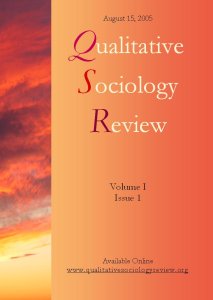"Oh yes, I remember it well!" Reflections on Using the Life-Grid in Qualitative Interviews with Couples
DOI:
https://doi.org/10.18778/1733-8077.1.1.04Keywords:
life-grid, retrospective data, qualitative interviewing, recall, couples, reflexivityAbstract
The life-grid has previously been used as a tool for improving the reliability of retrospective data in epidemiology. Recent research has suggested that the life-grid may also prove a useful tool for qualitative sociological interviewing, by facilitating the asking of difficult questions and acting as an aide memoire. This paper describes a pilot study which examines the influences the life-grid has upon qualitative interviews with married couples. It finds that use of the life-grid limits interviewees’ willingness to revisit topics, tends to create “event-centred”, non-reflexive, data and does not facilitate the asking of difficult questions. This paper does find that the life-grid acts to stimulate recall, but in a limited, factual fashion. It concludes that the life-grid is unlikely to prove an appropriate tool for qualitative researchers in its present form.
Downloads
References
Bell, Andrew J. (2003) Balancing the Borders. Edinburgh: Children in Scotland.
Google Scholar
Berney, Lee R., and Blane, David B. (1997) "Collecting Retrospective Data: Accuracy of Recall After 50 Years Judged Against Historical Records." Social Science and Medicine 45(10): 1519-1525.
Google Scholar
DOI: https://doi.org/10.1016/S0277-9536(97)00088-9
Blane, David B. (1996) "Collecting Retrospective Data: Development of a Reliable Method and a Pilot Study of its Use." Social Science and Medicine 42(5): 751-757.
Google Scholar
DOI: https://doi.org/10.1016/0277-9536(95)00340-1
Cherry, Nicola, and Brian Rodgers (1979) "Using a Longitudinal Study to Assess the Quality of Retrospective Data." in The Recall Method in Social Surveys, edited by L. Moss, and H Goldstein. Hove, Sussex: University of London Institute of Education.
Google Scholar
Coleman, Peter G. (1991) "Ageing and life history: the meaning of reminiscence in late life." Pp. 120 - 143 in Life and Work History Analyses: Qualitative and Quantitative Developments, edited by S. Dex. London: Routledge.
Google Scholar
DOI: https://doi.org/10.1111/j.1467-954X.1989.tb03340.x
Dex, Shirley, editor (1991) Life and Work History Analyses: Qualitative and Quantitative Developments. London: Routledge.
Google Scholar
Doucet, Andrea (1996) "Encouraging Voices: Towards More Creative Methods for Collecting Data on Gender and Household Labour." in Gender Relations in Public and Private, edited by L. Morris and E. S. Lyon. Basingstoke, Macmillan Press Ltd.
Google Scholar
DOI: https://doi.org/10.1007/978-1-349-24543-7_9
GRO-Scotland (2004) "Table UV10: Ethnic Group (Scotland)." Available by application to customer@gro-scotland.gsi.gov.uk
Google Scholar
Higgins, Millicent et al. (1982) "An Index of Risk for Obstructive Airways Disease." American Review of Respiratory Disease 125: 144-151.
Google Scholar
Holland, Puala, Lee Berney, David Blane and George Davey-Smith (1999) "The Life Grid Method in Health Inequalities Research." Health Variations 3: 8-9.
Google Scholar
Holsti, Ole R. (1969) Content Analysis for the Social Sciences. London: Addison-Wesley Publishing Company.
Google Scholar
Huberman, A. Michael, and Matthew B. Miles (1994) "Data Management and Analysis Methods." Pp. 428 - 444 in Handbook of Qualitative Research, edited by N. K. Denzin and Y. S. Lincoln. London: Sage Publications.
Google Scholar
Loftus, Elizabeth F. and Wesley Marburger (1983) "Since the eruption of Mt St Helens, has anyone beaten you up?" Memory & Cognition 11(2): 114-120.
Google Scholar
DOI: https://doi.org/10.3758/BF03213465
Nunan, David (1993) Introducing Discourse Analysis. London: Penguin Books Ltd.
Google Scholar
Parry, Odette, Carolyn Thomson and Gerry Fowkes (1999) "Life Course Data Collection: Qualitative Interviewing using the life-grid." Sociological Research Online 4(2). Retrieved December 16, 2004 http://www.socresonline.org.uk/socresonline/4/2/parry.html
Google Scholar
DOI: https://doi.org/10.5153/sro.233
Rosenthal, Gabriele (1993) "Reconstruction of Life Stories: Principles of Selection in Generating Stories for Narrative Biographical Interviews." Pp. 59 - 91 in The Narrative Study of Lives, edited by R. Josselson and A. Leiblich. London: Sage.
Google Scholar
Scotland's Census Results Online (2004) "Table UV50: Approximated Social Group." Retrieved August 18, 2004 http://www.scrol.gov.uk/scrol/analyser/analyser?actionName=choose-topicand-table
Google Scholar
Sudman, Seymour and Norman M. Bradburn (1973) “Effects of time and memory factors on response in surveys.” Journal of the American Statistical Association 68: 805-815.
Google Scholar
DOI: https://doi.org/10.1080/01621459.1973.10481428
Wilson, Sarah et al (forthcoming) “Young People, Biographical Narratives and the Life Grid: Young people’s accounts of parental substance use”. Sociological Research Online.
Google Scholar
Downloads
Published
How to Cite
Issue
Section
License

This work is licensed under a Creative Commons Attribution-NonCommercial-NoDerivatives 4.0 International License.











